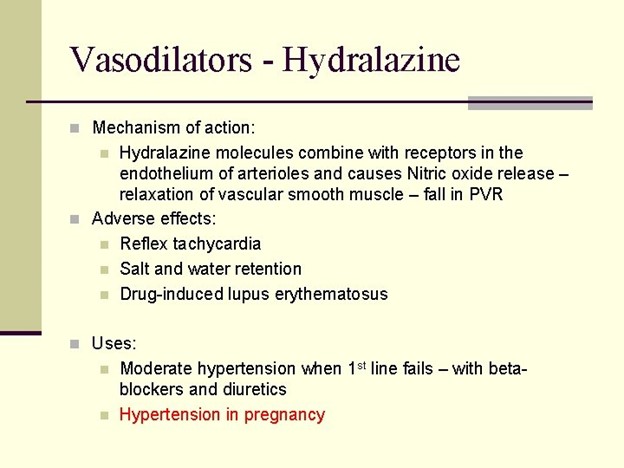Clinical Features
Clinical Features ( 16 Questions)
A nurse is preparing to administer hydralazine to a client with pre-eclampsia who has a blood pressure of 180/110 mmHg.
What is the rationale for using this medication?
Hydralazine does not reduce cerebral edema or prevent seizures. These are symptoms of eclampsia, a more severe form of pre-eclampsia that requires different treatment.
Hydralazine does not increase uteroplacental perfusion or fetal oxygenation. These are affected by other factors such as the placental function, maternal position, and fetal well-being.
Hydralazine does not decrease proteinuria or prevent renal damage.
Proteinuria is a sign of kidney impairment that occurs in pre-eclampsia, but it is not directly affected by hydralazine. Renal damage can be prevented by controlling blood pressure and avoiding nephrotoxic drugs.
This is the rationale for using this medication in a client with pre-eclampsia who has a blood pressure of 180/110 mmHg. High blood pressure in pre-eclampsia can cause damage to the kidneys, liver, brain, and other organs, and can also increase the risk of complications for the baby.
Therefore, lowering blood pressure with hydralazine can help prevent or reduce these adverse outcomes.

This is the rationale for using this medication in a client with pre-eclampsia who has a blood pressure of 180/110 mmHg. High blood pressure in pre-eclampsia can cause damage to the kidneys, liver, brain, and other organs, and can also increase the risk of complications for the baby.
Therefore, lowering blood pressure with hydralazine can help prevent or reduce these adverse outcomes.

Choice A is wrong because hydralazine does not reduce cerebral edema or prevent seizures. These are symptoms of eclampsia, a more severe form of pre-eclampsia that requires different treatment.
Choice B is wrong because hydralazine does not increase uteroplacental perfusion or fetal oxygenation. These are affected by other factors such as the placental function, maternal position, and fetal well-being.
Choice C is wrong because hydralazine does not decrease proteinuria or prevent renal damage.
Proteinuria is a sign of kidney impairment that occurs in pre-eclampsia, but it is not directly affected by hydralazine. Renal damage can be prevented by controlling blood pressure and avoiding nephrotoxic drugs.
